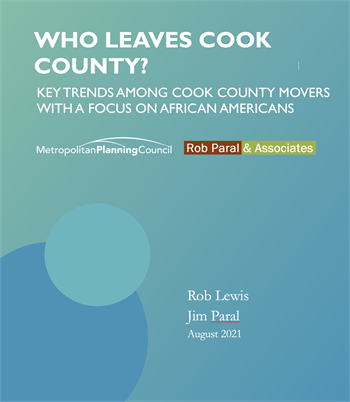 By Daniel Cooper and Jim Lewis, Senior Associate, Rob Paral and Associates
By Daniel Cooper and Jim Lewis, Senior Associate, Rob Paral and Associates - August 10, 2021
Understanding the well-documented loss of Black residents of Chicago and Cook County is a complex issue. Commentators in recent years have identified lack of jobs, problems with schools, neighborhood safety, disinvestment, gentrification, and loss of public housing units as likely causes. Our analysis of recent Census data breaks down Black movers across multiple categories... age, sex, occupation, family structure, education, and income... to provide a more nuanced analysis. These findings suggest that Black residents who left Cook County have done so for a variety of reasons, with some considerations likely more important to some than to others. This nuance is important in identifying the right policy prescriptions for retaining and attracting new Black residents.

Learn more in MPC's new report examining population change among African Americans in Cook County
Our research sought to identify the characteristics of movers that tend to correlate with one another within the Census data, thereby creating rough profiles of the persons represented in the data. Applying this analysis to Black movers from Cook County reveals the most common types of persons who have been moving. These seven types account for about 50% of all Black movers.
- Younger to middle-aged, well-educated employed management professionals, often working in the educational and health care professions.
- Younger, moderate-income, employed, sales and service workers, particularly in retail. Many don’t have children.
- Male production, transportation and warehousing workers, some of whom have children.
- Younger and middle-aged, many with only high school education or less, who largely worked in restaurants, hotels, or entertainment.
- Younger women, many with high school education or less, many with children, a few in information jobs, some not in the labor force.
- Younger, poor persons who have worked in retail and/or sales.
- Mixed age, low-educated, not poor, who have worked in service occupations.
Black residents who leave Cook County tend to be younger, but include upper-income professionals and the employed middle class, but also large numbers of low-income and less educated people who identified as lower-wage retail, hospitality and service workers who have characterized much of the County’s recent job growth. The wide variety of movers suggests that rather than any single policy intervention, a wide variety of things need to happen to stem the outward flow – neighborhood improvement; better job opportunities and wages, particularly for the less-skilled; more job access; improved neighborhood safety; and stronger educational outcomes.
The balance of Black in- and out-migration also speaks to Cook County’s perceived economic opportunity. We analyzed the occupations and industries of Black in- and out-migrants. In recent years, Black managers and professionals have roughly replaced one another as some have left Cook County for nearby counties or other parts of the nation, but many managers and professionals from other states have moved to Cook. Chicago is a world-class city in a wide variety of business services and corporate management fields and Blacks nationally seeking careers in those fields are more likely to find jobs in those professions here than almost anywhere else.
The story is different for people in the less-skilled occupations. There, Black leavers have outnumbered arrivers by a ratio of about two-to-one. The loss of neighborhood jobs, manufacturing jobs and jobs accessible to Black communities has been well-documented by researchers at the University of Illinois at Chicago, the Metropolitan Planning Council, and others. Non-college-educated Black residents may leave Cook County in search of employment, or simply not consider low-wage employment sufficient reason to stay if other aspects of the city fail them. Likewise, less-educated Blacks in other parts of the country no longer consider Cook County or Chicago an economic destination and its economic opportunities probably do not offset its negative national reputation for violence, segregation, and uneven schools.
Short of major policy innovations attacking the problems noted above and by many others, we might predict the continued flight of Black residents from Chicago’s most challenged neighborhoods, and likely some in south suburban Cook as well, which suffer from many of the same problems. On the more hopeful side, the data suggests persistence of Black residents in professional and managerial positions, and in the fields of education and healthcare.